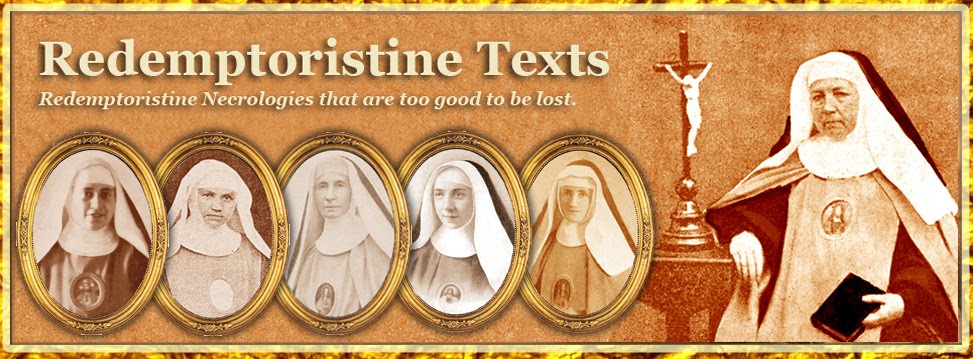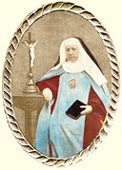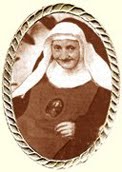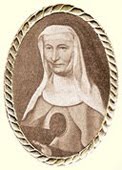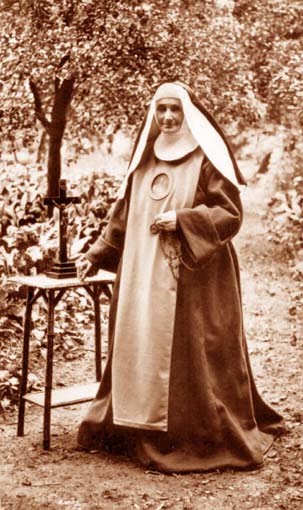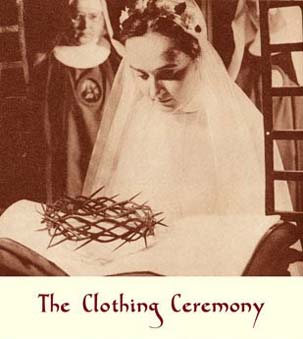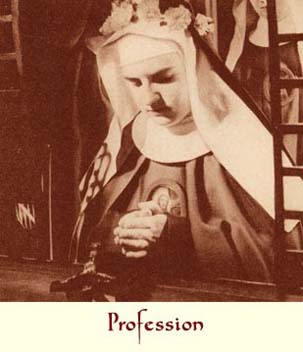Superior of the Monastery of Malines [1]
In the world : Baroness Amélie Marie Hyacinth
VAN DER STRAETEN-WAILLET
In the world : Baroness Amélie Marie Hyacinth
VAN DER STRAETEN-WAILLET
Coming from a family more worthy of commendation still by its faith and by its virtue than by its nobility, Mother Marie-Anne-Joseph of Jesus understood very early on the vanity and the nothingness of things that pass away, and her great heart made her despise all the advantages that her birth and spirit could procure her in the world, so as to don the humble habit of a postulant of the Most Holy Redeemer in our provisional convent of Brussels.
She made her entry there on January 23, 1857, at the age of 33. A small incident showed her energy, and the self-control she already had over herself. While giving the kiss of peace to the Sisters, her veil caught fire from the candle one of them was holding. Immediately, without being moved in any way at all, she unfastened it, threw it on the ground, trampled on it, and continued to peacefully give everyone the kiss of peace. A singular or providential particularity had signalled her admission. A young person, who had some desire to enter to the convent, had come to ask a novena for the purpose of knowing her vocation. The Reverend Mother Marie-Alphonse of the Will of God, while indicating this intention in her prayers, made a mistake and instead of saying: “For Miss Mathilde”, she announced: “For Miss Amélie.” At recreation, the Sisters hastened to tell the Reverend Mother: “My Mother, are we going to have an Amélie, a new companion? You prayed for her.” The Reverend Mother replied: “Did I say Amélie?” – “Yes, my Mother! Oh! We are going to have an Amélie!” A remarkable thing! Only a few days went by, and then there was an announcement that Madam the Baroness Van der Straeten had come to present her daughter, who was anxious to enter the small Redemptoristine community… Oh what joy and thanksgiving for this new reception! Two more vocations had come to strengthen the newborn foundation, transferred from Brussels in Malines October 6, 1858 indeed.[2]
When her educandate and novitiate were finished, Sister Marie-Anne-Joseph of Jesus made her profession at Malines, between the hands of M. Bosmans, the Dean and Archpriest of the metropolis of Saint-Rombaut, who made the usual speech. It took place on March 2, 1859. The ceremony was held with great solemnity: it was the first profession since the transfer of the community to Malines. The pious Sister distinguished herself, during her novitiate, by her love of prayer and her sincere charity; and so she had given rise to the most beautiful expectations.
* * * * *
These expectations were not disappointed. After the second year of her novitiate, granted by the Rule to perfect herself in the exercise of the virtues, Sister Marie-Anne-Joseph was employed in helping with the housekeeping. It was an office of abnegation that she fulfilled with docility and the goodwill of a true child of Saint Alphonsus. She was then successively called to the tasks of Sacristine, Tourière, Infirmarian, Linen-maid, etc., and she exercised them all with the same goodwill and the same devotion, applying herself to vanquishing herself in the small things and refusing nothing to God.
Humility was the principal object of the prayers and efforts of our good Sister ; but in this she saw the most supreme means of arriving at God's love that she was seeking above all else. And so she entered into a long and hard struggle with her own self-esteem, happy or at least resigned to be humiliated and contradicted. Her character was inclined somewhat to the spirit of contradiction. She triumphed over it while profiting from all occasions for showing herself as cordial and considerate towards her neighbours.
A friend of mortification and penance, she rightly considered habitual contrition as a source of precious favours, and drew profit from the little sufferings that presented themselves. She imposed certain privations on herself and was attached to imitating her divine Saviour, while loving the poor, humbling and painful side of religious life. What was she in her own eyes? Simply nothing and she meditated gladly, like the Saints, on her own lowliness, knowing full well that we never mortify ourselves unless we have learnt to hate ourselves first.
As with blessed Father Saint Alphonsus, she made all her perfection consist in perfect conformity with God's will. “I understand,” she wrote one day, “that indifference is indeed the corner-stone of purity of intention. It desires only to know what You desire, O my God, in order to accomplish it. It is therefore myself that I am seeking when I want You to want something rather than something else. How much seeking I have had to arrive here, O my good Jesus! I ask pardon from You for it, and by this love that made You suffer so much to merit for me the grace to be all Yours, grant me, I implore you, so great a love for you that I shall forget myself in order to think of nothing more than You and Your interests.” So she made every effort to fulfil the beautiful words of the Apostle: “I live, but it is no longer I that lives, it is Christ who lives in me.”, words that Saint Alphonse understood as perfect conformity with God's will.
The filial piety of Mother Marie-Anne-Joseph towards Saint Alphonsus, and the high esteem that she had for his holiness and teachings, led her to find in his writings a substantial food, free from all pretension and full of the wisdom of the Saints. To use the words of Father Monsabré, “She did not like writers who speak of the things of God in too far-fetched and precious a style that invites ridicule, if it does not fall into it. She preferred the tender effusions of the pious authors who do not make our minds spin, and do not torment the dictionary to make their hearts speak.”[3]
As a worthy daughter of Saint Alphonse, she had a quite special devotion to the Holy Childhood, the Passion of Our Lord and the Blessed Sacrament. Her confidence in the Blessed Virgin and her love for her was that of a child towards her Mother. Her devotion to Saint Joseph, her Patron, was also very solid. She especially liked this admirable conformity to God's will in the holy Patriarch that characterized him. Finally she tenderly loved the Holy Angels, her guardian angel in particular, and she prayed to him to remind her constantly of her good resolutions.
* * * * *
All the many graces, lights and good sentiments that filled her soul were exactly the right qualities for her to perfectly fulfil first the task of Mistress of Educandes, then that of Mistress of the Novices, that were confided to her. Understanding how important these function were, she applied herself to examining the dispositions of her young plants, in order to be sure if they were destined to bear fruit conforming to the spirit of our Institute. And this is especially why she did not spare either her cares or her prayers, forgetting her own self in order to help, fortify, encourage and console as required, the souls entrusted to her solicitude.
She was elected Vicar on June 10, 1878 in place of Sister Marie-Véronique, who was leaving to help found the house at Grenoble, and then named as Superior in 1879. She was named again in 1886, and also for the next two triennia, with an Indult being granted by Rome to this effect.
Reverend Mother Marie-Anne-Joseph of Jesus governed with wisdom, prudence and charity: her solicitude extended to all; she responded to the needs of the Sisters, and showed herself especially eager to procure them every relief when they were seriously ill, and devoted herself entirely to the good spiritual and temporal government of her community.
Zealous for the cult of the Blessed Sacrament, she got the Archdiocese to permit the holy Ciborium, from Holy Thursday until Holy Saturday after the office of Matins, to remain, no longer in the exterior sacristy, but in choir, in a tabernacle placed on a little altar, devoutly decorated. It is also to this good Mother's that we owe the beautiful arrangement of the treasury of the relics that surmount and surround this small altar. Her heart was as if flooded with joy on the day when the great and numerous bones of these good Saints were brought from the Convent of Saint-Trond and offered as a present by one our Fathers. Her piety, at the sight of these relics, lit up her face, and her words expressed her great gratitude for so precious a gift.
The Sisters who had resort to her maternal solicitude were sure of finding her full of the insights, advice, wise counsels and encouragement which they needed ; her virtues had acquired a general esteem for her, and persons from outside themselves were able to appreciate her great qualities and her generous charity.
Deposed from her task in 1894, then named Vicar, Mother Marie-Anne-Joseph was henceforth a living example to her Sisters of the most exact and edifying obedience. Nevertheless, she was not long in receiving her reward for her works.
Towards the end of February 1895, she had a cold that degenerated into bronchitis, and then pneumonia, and reduced her suddenly to the verge of death. On March 6, at eight o'clock in the evening, she devoutly received the last sacraments. Immediately after this imposing ceremony, she said gravely: “I have received many holy things in a short time: all the rest is nothing.” And as the Sister infirmarian told her: « Look, it is the influenza which is making you suffer”, she replied: “It is not the influenza, it is God who wants it.” They offered to call the Rev. Jesuit Father, her brother, to her; but she refused this consolation and offered it in sacrifice to God.
The night of 9th to 10th March was a painful one. In the afternoon, the good Mother was confessed for the last time, received the apostolic benediction and urgently asked to receive communion. This blessing was procured for her; a few moments had hardly passed when she peacefully rendered her soul to God. The memory of her wonderful examples will not perish in the hearts of those that knew her, and they will remember the words which she took as her motto: “I believe that God loves me with an infinite love: I believe that Mary loves me with a very tender love, a Mother’s love; I abandon myself to their love, and I want to love them as much as I can on earth so as to love them even more in the eternity.”
She made her entry there on January 23, 1857, at the age of 33. A small incident showed her energy, and the self-control she already had over herself. While giving the kiss of peace to the Sisters, her veil caught fire from the candle one of them was holding. Immediately, without being moved in any way at all, she unfastened it, threw it on the ground, trampled on it, and continued to peacefully give everyone the kiss of peace. A singular or providential particularity had signalled her admission. A young person, who had some desire to enter to the convent, had come to ask a novena for the purpose of knowing her vocation. The Reverend Mother Marie-Alphonse of the Will of God, while indicating this intention in her prayers, made a mistake and instead of saying: “For Miss Mathilde”, she announced: “For Miss Amélie.” At recreation, the Sisters hastened to tell the Reverend Mother: “My Mother, are we going to have an Amélie, a new companion? You prayed for her.” The Reverend Mother replied: “Did I say Amélie?” – “Yes, my Mother! Oh! We are going to have an Amélie!” A remarkable thing! Only a few days went by, and then there was an announcement that Madam the Baroness Van der Straeten had come to present her daughter, who was anxious to enter the small Redemptoristine community… Oh what joy and thanksgiving for this new reception! Two more vocations had come to strengthen the newborn foundation, transferred from Brussels in Malines October 6, 1858 indeed.[2]
When her educandate and novitiate were finished, Sister Marie-Anne-Joseph of Jesus made her profession at Malines, between the hands of M. Bosmans, the Dean and Archpriest of the metropolis of Saint-Rombaut, who made the usual speech. It took place on March 2, 1859. The ceremony was held with great solemnity: it was the first profession since the transfer of the community to Malines. The pious Sister distinguished herself, during her novitiate, by her love of prayer and her sincere charity; and so she had given rise to the most beautiful expectations.
* * * * *
These expectations were not disappointed. After the second year of her novitiate, granted by the Rule to perfect herself in the exercise of the virtues, Sister Marie-Anne-Joseph was employed in helping with the housekeeping. It was an office of abnegation that she fulfilled with docility and the goodwill of a true child of Saint Alphonsus. She was then successively called to the tasks of Sacristine, Tourière, Infirmarian, Linen-maid, etc., and she exercised them all with the same goodwill and the same devotion, applying herself to vanquishing herself in the small things and refusing nothing to God.
Humility was the principal object of the prayers and efforts of our good Sister ; but in this she saw the most supreme means of arriving at God's love that she was seeking above all else. And so she entered into a long and hard struggle with her own self-esteem, happy or at least resigned to be humiliated and contradicted. Her character was inclined somewhat to the spirit of contradiction. She triumphed over it while profiting from all occasions for showing herself as cordial and considerate towards her neighbours.
A friend of mortification and penance, she rightly considered habitual contrition as a source of precious favours, and drew profit from the little sufferings that presented themselves. She imposed certain privations on herself and was attached to imitating her divine Saviour, while loving the poor, humbling and painful side of religious life. What was she in her own eyes? Simply nothing and she meditated gladly, like the Saints, on her own lowliness, knowing full well that we never mortify ourselves unless we have learnt to hate ourselves first.
As with blessed Father Saint Alphonsus, she made all her perfection consist in perfect conformity with God's will. “I understand,” she wrote one day, “that indifference is indeed the corner-stone of purity of intention. It desires only to know what You desire, O my God, in order to accomplish it. It is therefore myself that I am seeking when I want You to want something rather than something else. How much seeking I have had to arrive here, O my good Jesus! I ask pardon from You for it, and by this love that made You suffer so much to merit for me the grace to be all Yours, grant me, I implore you, so great a love for you that I shall forget myself in order to think of nothing more than You and Your interests.” So she made every effort to fulfil the beautiful words of the Apostle: “I live, but it is no longer I that lives, it is Christ who lives in me.”, words that Saint Alphonse understood as perfect conformity with God's will.
The filial piety of Mother Marie-Anne-Joseph towards Saint Alphonsus, and the high esteem that she had for his holiness and teachings, led her to find in his writings a substantial food, free from all pretension and full of the wisdom of the Saints. To use the words of Father Monsabré, “She did not like writers who speak of the things of God in too far-fetched and precious a style that invites ridicule, if it does not fall into it. She preferred the tender effusions of the pious authors who do not make our minds spin, and do not torment the dictionary to make their hearts speak.”[3]
As a worthy daughter of Saint Alphonse, she had a quite special devotion to the Holy Childhood, the Passion of Our Lord and the Blessed Sacrament. Her confidence in the Blessed Virgin and her love for her was that of a child towards her Mother. Her devotion to Saint Joseph, her Patron, was also very solid. She especially liked this admirable conformity to God's will in the holy Patriarch that characterized him. Finally she tenderly loved the Holy Angels, her guardian angel in particular, and she prayed to him to remind her constantly of her good resolutions.
* * * * *
All the many graces, lights and good sentiments that filled her soul were exactly the right qualities for her to perfectly fulfil first the task of Mistress of Educandes, then that of Mistress of the Novices, that were confided to her. Understanding how important these function were, she applied herself to examining the dispositions of her young plants, in order to be sure if they were destined to bear fruit conforming to the spirit of our Institute. And this is especially why she did not spare either her cares or her prayers, forgetting her own self in order to help, fortify, encourage and console as required, the souls entrusted to her solicitude.
She was elected Vicar on June 10, 1878 in place of Sister Marie-Véronique, who was leaving to help found the house at Grenoble, and then named as Superior in 1879. She was named again in 1886, and also for the next two triennia, with an Indult being granted by Rome to this effect.
Reverend Mother Marie-Anne-Joseph of Jesus governed with wisdom, prudence and charity: her solicitude extended to all; she responded to the needs of the Sisters, and showed herself especially eager to procure them every relief when they were seriously ill, and devoted herself entirely to the good spiritual and temporal government of her community.
Zealous for the cult of the Blessed Sacrament, she got the Archdiocese to permit the holy Ciborium, from Holy Thursday until Holy Saturday after the office of Matins, to remain, no longer in the exterior sacristy, but in choir, in a tabernacle placed on a little altar, devoutly decorated. It is also to this good Mother's that we owe the beautiful arrangement of the treasury of the relics that surmount and surround this small altar. Her heart was as if flooded with joy on the day when the great and numerous bones of these good Saints were brought from the Convent of Saint-Trond and offered as a present by one our Fathers. Her piety, at the sight of these relics, lit up her face, and her words expressed her great gratitude for so precious a gift.
The Sisters who had resort to her maternal solicitude were sure of finding her full of the insights, advice, wise counsels and encouragement which they needed ; her virtues had acquired a general esteem for her, and persons from outside themselves were able to appreciate her great qualities and her generous charity.
Deposed from her task in 1894, then named Vicar, Mother Marie-Anne-Joseph was henceforth a living example to her Sisters of the most exact and edifying obedience. Nevertheless, she was not long in receiving her reward for her works.
Towards the end of February 1895, she had a cold that degenerated into bronchitis, and then pneumonia, and reduced her suddenly to the verge of death. On March 6, at eight o'clock in the evening, she devoutly received the last sacraments. Immediately after this imposing ceremony, she said gravely: “I have received many holy things in a short time: all the rest is nothing.” And as the Sister infirmarian told her: « Look, it is the influenza which is making you suffer”, she replied: “It is not the influenza, it is God who wants it.” They offered to call the Rev. Jesuit Father, her brother, to her; but she refused this consolation and offered it in sacrifice to God.
The night of 9th to 10th March was a painful one. In the afternoon, the good Mother was confessed for the last time, received the apostolic benediction and urgently asked to receive communion. This blessing was procured for her; a few moments had hardly passed when she peacefully rendered her soul to God. The memory of her wonderful examples will not perish in the hearts of those that knew her, and they will remember the words which she took as her motto: “I believe that God loves me with an infinite love: I believe that Mary loves me with a very tender love, a Mother’s love; I abandon myself to their love, and I want to love them as much as I can on earth so as to love them even more in the eternity.”
Footnotes
[1] About the foundation of this Monastery, consult the work by P. Nimal mentioned above. – It took place in 1858.
[2] The reception took place on 10th February 1858.
[3] P. Monsabré. Drops of truth, p. 52. (1 vol. Lethielleux).
May we permit ourselves in this regard to mention here some appreciations borrowed from the correspondence of Saint Alphonsus concerning several of his ascetic works. On the subject of the Glories of Mary, the holy Doctor wrote to Remondini : “It is the book I spent the most time working on and maybe the one that had the most success.”
Regarding the numerous opuscules such as the Novenas to the Sacred Heart, the Holy Spirit, to Saint Michael, Christmas, Reflections and affections on the Passion of Our Lord, etc., Saint Alphonsus wrote: “They are short, but had a lot of work done on them and are full of things; and to compose these small works, I read the hundreds of books from which I took the best.”
The Practice of the Love of Jesus Christ has thus been judged by its author: “This little work is perhaps more devout and useful than all the others.” The Pious Reflections on different subjects of spirituality “were composed expressly for the souls that wish to be entirely in God.”
Finally, “The true Spouse of Jesus Christ” or “The nun sanctified”, as Saint Alphonsus also called it, is “of all his books of spirituality the most beautiful, the most worked on; it is so to speak, the epitome of everything that the other authors have written on the sanctification of nuns.” See Correspondence, T., IV, P. 112. –IV, P. 68. –IV, P. 347. –II, 480. –IV. 133.
This necrology is translated from Fleurs de l'Institut des Rédemptoristines by Mr John R. Bradbury. The copyright of this translation is the property of the Redemptoristine Nuns of Maitland, Australia. The integral version of the translated book will be posted here as the necrologies appear.
